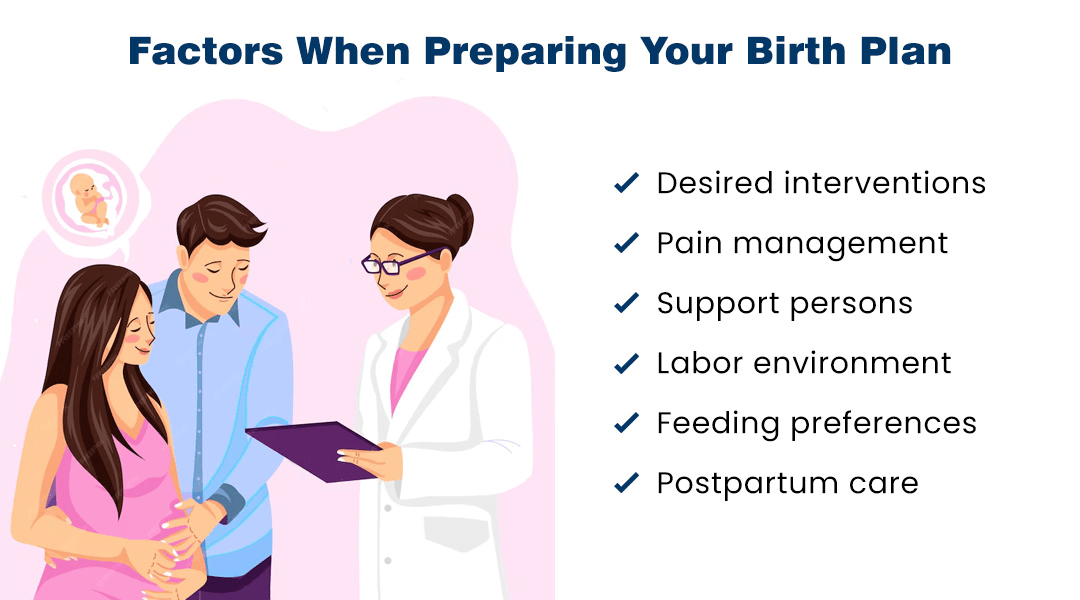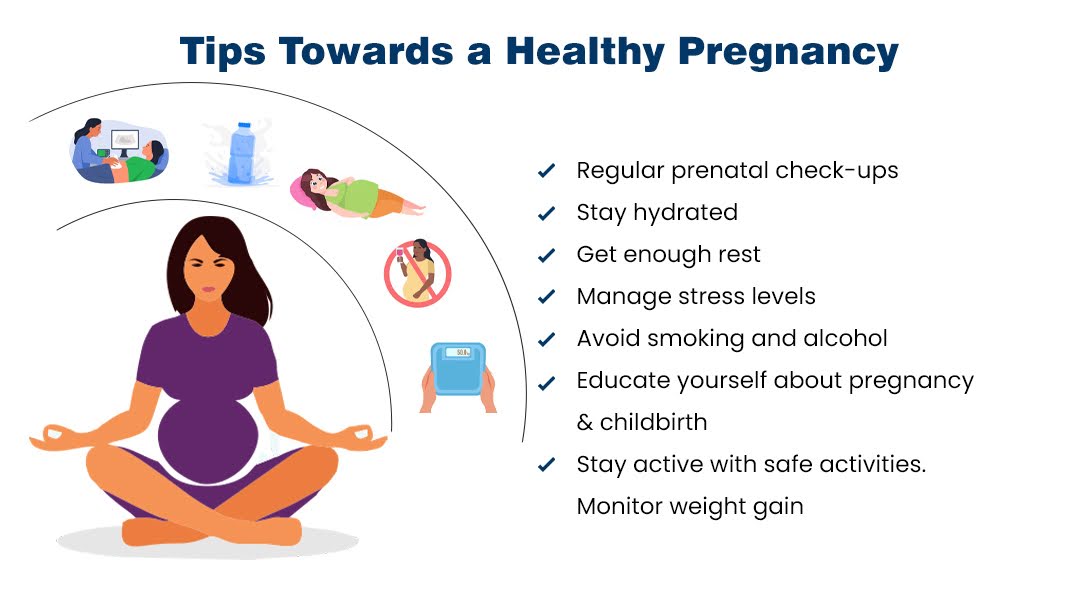When it comes to ensuring a healthy pregnancy, it is never too early to begin planning. Surprisingly, statistics suggest that a large portion, approximately 40 to 50%, of pregnancies are unplanned. For this reason, all women of reproductive age must have access to reliable birth control. This allows them to have the option to discontinue contraceptive use and make necessary lifestyle adjustments when they decide to start family planning, leading to a healthier pregnancy.
As you embark on this pregnancy journey, it's completely normal to experience a range of emotions. So, first and foremost, let us congratulate you! This is a time filled with excitement and anticipation. However, it's also common for worries and anxieties to arise about your health and the health of your little one.
Taking care of your well-being is essential for giving your baby the best possible start. You may have numerous questions about what you can do over the next ten months to ensure a healthy pregnancy. And it's okay to feel a bit nervous or emotional. Remember, your healthcare provider or midwife will be a partner on this journey. Together, you will attend regular prenatal appointments as you work towards a healthy and fulfilling pregnancy. So, let's begin:
1. Pre-Planning Things is Always Smart
During the earliest stages of pregnancy, organ formation is of utmost importance. If the pregnancy is unplanned, there is a greater likelihood of the fetus being exposed to controllable dangers, such as medication, substance use, or alcohol consumption. Having a preconceived plan for pregnancy can significantly benefit both you and your medical provider in monitoring and managing any pre-existing health conditions, such as hypertension. Your doctor can also assist in finding alternative medications that are safe for use during pregnancy.
2. Be Up to Date on Your Prenatal Visits
Ensure your pregnancy health by attending prenatal appointments at your healthcare provider's office. These regular appointments are crucial in keeping you and your baby in the best possible state throughout your pregnancy. Your healthcare provider will set up a schedule for you, and it may look something like this for healthy pregnant women under 35:
- Monthly appointments from week 4 to week 28
- Bi-weekly appointments from week 28 to week 36
- Weekly appointments from week 36 until birth for women with preexisting medical conditions or complications during pregnancy; more frequent check-ups may be necessary.
During your first visit, your provider will perform a comprehensive health assessment, which may include:
- Inquiring about any past pregnancies
- Conducting a complete physical examination, including a pelvic exam and other necessary tests.
- Checking vital signs such as blood pressure
- Keeping track of your height and weight
Your due date will also be estimated based on your health and medical background. Your medical history will be discussed during your appointment, and any potential health concerns will be addressed. Blood and urine samples will be taken for laboratory analysis to ensure your and your baby's safety. Your blood will be screened for factors such as blood type, Rh factor, and possible infections.
Urine samples will also be examined for any signs of bacteria, which could indicate a urinary tract infection. You will have the opportunity to discuss any medications you have been taking before becoming pregnant. You can make informed decisions about which medications are safe to continue taking during your pregnancy with your doctor.

3. Prepare a Birth Plan/Chart
Are you set on hiring a doula? Are you relying on the comfort of an epidural? Document your preferences and distribute them to all those involved in your labor and delivery. Take into account the following factors when composing your birth plan:
- Who do you want to have by your side
- Are there any medical procedures you wish to avoid
- Which positions do you find most comfortable for labor and delivery
- Do you have any specific clothing requests
- Would you like to have music or a meaningful focal point during the process
- Are you open to pain medication, and if so, which types
- Have you considered a plan in case of complications arising
4. Practice Your Kegel Exercises
Did you know that doing Kegel exercises can significantly strengthen the muscles in your pelvic floor? These muscles are crucial in supporting your bladder, bowels, and uterus. Not only can this simple exercise make your delivery more accessible, but it can also prevent issues with incontinence down the road.
The best part? Kegels can be done in secret without anyone noticing! You can squeeze those muscles while driving, sitting at your desk, or waiting in line at the store. Here's how to do them correctly:
- First, practice squeezing your pelvic muscles as if you're trying to stop the urine flow.
- Hold this for three seconds, then relax for another three seconds
- Repeat this process ten times for a complete set
By adding this quick exercise into your routine, you can reap the benefits without anyone ever knowing!
Also Read:
5. Take Care of Your Mental Health
As you navigate through pregnancy, there are many things to consider. It's easy to feel overwhelmed with everything going on. One important thing to be aware of is that depression is a common occurrence during this time, affecting about 1 in 10 expecting mothers.
It can be challenging to distinguish between the average highs and lows of pregnancy and experiencing clinical depression. If you feel consistently sad or down for more than two weeks, it's crucial to inform your doctor. Signs of depression may include:
- Changes in sleeping and eating patterns, constant feelings of sadness
- Persistent fatigue
- Loss of interest in usual activities
- Thoughts of death or suicide
If you are in a crisis, please call 911 or visit the emergency room. You can also reach the 988 Suicide & Crisis Lifeline at 988 or 1-800-273-TALK (1-800-273-8255). They also offer text and chat services at 988lifeline.org.
By combining talk therapy and medication, you can regain a sense of self and feel like yourself again. It's important to acknowledge that women of color may face more significant concerns for their mental health.
Ultimately, you have yourself and your baby to care for when you're pregnant. Therefore, prioritizing your overall health and well-being throughout your pregnancy is of even greater importance.

6. Maintain a Hеalthy Body Wеight
Regarding your pregnancy, it's essential to have open and informative conversations with your doctor. One topic to discuss is the appropriate weight to gain during this time. Your doctor will assess your body mass index (BMI) at your first prenatal visit by measuring your height and weight. This will help determine the ideal amount of weight for you to gain and the daily calorie intake needed. A healthy weight range for someone with a normal prepregnancy BMI is typically 25 to 35 pounds.
However, your doctor may suggest a higher weight gain if you are underweight to ensure a healthy pregnancy. Conversely, if you are overweight or obese, your doctor may advise gaining less weight, as recommended by the American College of Obstetricians and Gynecologists (ACOG). Discussing these factors with your doctor to ensure a healthy and safe pregnancy journey is vital.
7. Rеst Up Plеnty
As you prepare for the arrival of your little one, it's understandable that you might feel like your schedule is already jam-packed. But once your baby is here, your precious alone time will likely become even more scarce. While it's recommended to get at least eight hours of sleep each night, it's not uncommon for sleep to become a challenge during pregnancy.
With the combination of pregnancy insomnia, strange dreams, frequent bathroom breaks, and physical discomforts, it's no wonder you may worry about ever feeling well-rested. You may need to adjust your routine to ensure you get enough quality sleep during this critical time. Going to bed earlier or taking naps during the day may help.
You may also want to invest in a pregnancy pillow to help you find a comfortable sleeping position.
Pregnancy pillows are bliss when it comes to providing comfort and ease during pregnancy. L-shape, C-shape, full-body pregnancy pillows, and more are significant options that offer the utmost comfort to expectant mothers.
8. Don’t Takе Up Evеry Chorе
Pregnancy can bring about added concerns even in routine tasks, like scrubbing the bathroom or tidying up after pets. Harmful chemicals or exposure to certain germs can pose a risk to both you and your developing baby. Keep these safety measures in mind to prioritize your well-being and that of your little one:
- Avoid using step stools or ladders
- Refrain from changing kitty litter (to protect against toxoplasmosis, a disease commonly found in cat feces)
- Be cautious with harsh cleaning products
- Take breaks from standing for prolonged periods, especially near a heated stovetop
- Wear gloves while working in the yard, as cats may have left their mark, and always wash your hands thoroughly after handling raw meat.
9. Changе Your Choicе of Footwеar
You may also notice your following suit as your belly expands—or at least it may seem that way. This is due to the natural weight gain during pregnancy, which can throw off your center of gravity and add extra strain to your tootsies. With time, this increased pressure can lead to painful overpronation or flattening of the feet.
Pregnancy can also cause fluid retention, resulting in swelling of the feet and ankles. To alleviate discomfort, it is crucial to wear comfortable, supportive footwear and take breaks to elevate your feet throughout the day. This will help prevent fatigue and reduce swelling in the feet, legs, and ankles.
10. Drink More Water
Throughout your pregnancy, your blood plays a crucial role by providing vital oxygen and nutrients to your growing baby through the placenta while removing waste and carbon dioxide. This increased workload results in your blood volume expanding up to 50%, making it essential to increase your fluid intake to keep up with the demands.
Moreover, staying hydrated has multiple benefits, including preventing constipation, hemorrhoids, UTIs, fatigue, headaches, and swelling—all common discomforts during pregnancy. A simple way to ensure you're getting enough fluids is to aim for eight to 10 glasses per day. If plain water doesn't entice you, add a splash of fruit juice or a squeeze of lime for some flavor.
11. Learn All About Postpartum Depression
You may be familiar with postpartum depression (PPD) and postpartum anxiety (PPA), but did you know that a significant percentage of pregnant individuals also experience major depression during pregnancy? According to the Journal of Pregnancy and Child Health (2017), between 10% and 25% of pregnant people exhibit symptoms of depression.
This can have serious consequences, including a higher likelihood of preterm labor. So, if you feel inexplicably sad, angry, or guilty, or if you've lost interest in activities you once enjoyed or are experiencing changes in sleep patterns, you must contact a healthcare provider.
Treatment options, such as therapy, support groups, antidepressant medication, or a combination, are available and can be effective. However, it's crucial to work with a healthcare professional who is knowledgeable about which types of antidepressants are safe during pregnancy.
12. Stay Up to Datе on Your Vaccinations
Secure your flight, but remember to take the necessary precautions. Experts recommend flying during mid-pregnancy (14 to 28 weeks) as morning sickness usually subsides by then, and the risk of complications is relatively low. Of course, it's always best to consult your doctor before booking travel plans and confirm that your chosen airline welcomes pregnant passengers.
While onboard, stay hydrated by drinking enough water and taking breaks to walk around every half hour to minimize the risk of developing blood clots. Opting for an aisle seat will also provide more space and easier access to the bathroom.
Don't compromise on safety for car travel by wearing a seatbelt with the shoulder strap positioned over your collarbone and the lap portion secured under your belly, as low as possible on your hips and across your upper thighs. Safety is a top priority, so never place the lap belt on or above your stomach.
Sources:
Have a Healthy Pregnancy: MyHealthfinder
Taking Care of You and Your Baby While You're Pregnant: Family Doctor













